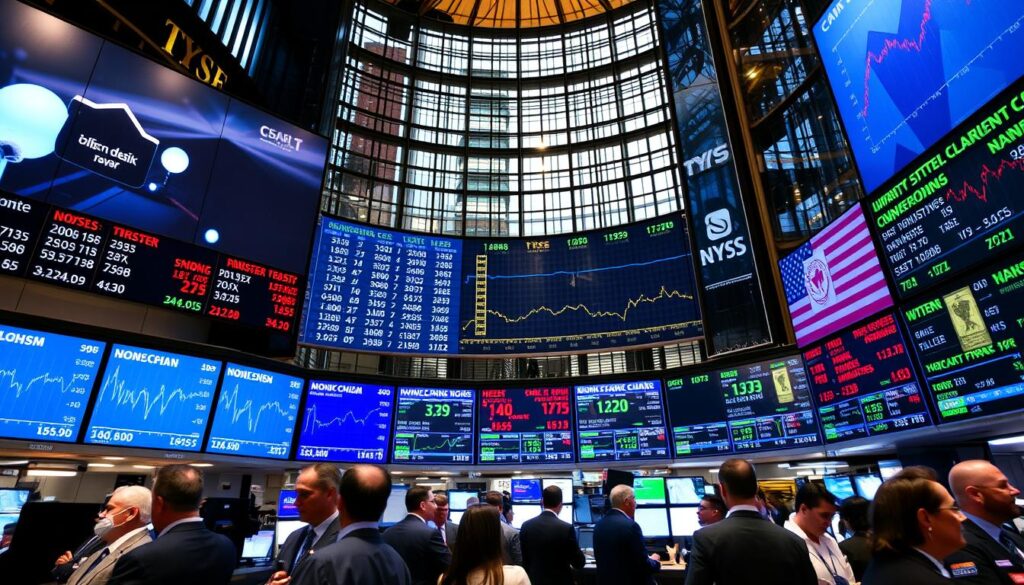In the fast world of finance, knowing trading hours today is key. Whether you’re new or experienced, each market has its own hours. These hours can change due to holidays and special events.
By keeping up with market trading hours today, you can improve your investment plans. This guide will help you understand different trading schedules. It also shows how to find updates easily, which is important for a good trading experience.
Key Takeaways
- Know the regular trading hours for various markets to make informed trading decisions.
- Pre-market and after-hours trading can offer unique opportunities and risks.
- Market closures occur on federal holidays and can impact liquidity and volatility.
- Stay updated with reliable resources for accurate trading hour information.
- Understanding global trading hours can enhance your trading strategies.
Understanding Trading Hours Across Different Markets
Trading hours change a lot between different financial markets. Knowing these hours can help improve your trading plan. This helps you time your trades better and find more opportunities. We’ll look at the trading times for stock, forex, and cryptocurrency markets.
Stock Market Trading Hours
The stock market hours for big exchanges are key. The New York Stock Exchange (NYSE) and the NASDAQ trade from 9:30 a.m. to 4 p.m. Eastern Time, every weekday. The Mexican Stock Exchange (BMV) matches these hours, even though it’s in the Central Time Zone. Here’s a table showing stock market hours in major areas:
| Exchange | Trading Hours (Local Time) |
|---|---|
| New York Stock Exchange | 9:30 AM – 4:00 PM ET |
| Mexican Stock Exchange | 9:30 AM – 4:00 PM CT |
| São Paulo Stock Exchange | 10:00 AM – 4:55 PM BRT |
| Australian Securities Exchange | 10:00 AM – 4:00 PM AEST |
| Johannesburg Stock Exchange | 9:00 AM – 5:00 PM SAST |
Forex Market Trading Hours
Forex trading times offer a 24-hour trading chance. The market is open all day, every day, starting in Sydney, then Asia, Europe, and North America. This lets traders take advantage of global market changes at almost any time.
Cryptocurrency Market Trading Hours
Cryptocurrency trading is open all the time. Cryptocurrency trading hours are available 24/7. This means traders can buy, sell, and exchange digital assets whenever they want, even on weekends or holidays.
Importance of Knowing Trading Hours
Knowing trading hours is key for good investment plans. Each market has its own hours, affecting when to buy or sell. This knowledge helps plan trades and improve timing for entry and exit, boosting profits.
Impact on Investment Strategies
Investment plans should match trading hours to make the most of market conditions. For example, U.S. stock markets open from 9:30 a.m. to 4:00 p.m. ET. These hours see more trading, especially at the start and end.
Pre-market and after-hours trading offer different risks and chances. Prices can swing wildly, especially with news. Quick market entry can be a big advantage for active traders.
Timing for Market Entry and Exit
The best time to enter the market often is when volumes are high, usually in the first and last hours. Traders might use stop orders early to manage risks. It’s important to watch for economic news or earnings reports that can cause sudden price changes.
Being ready for these changes can lead to success in fast-paced trading environments.
How to Check Trading Hours
Investors looking for the latest on trading hours can find great help online. Real-time data is key for making quick decisions. There are two main ways to check trading hours: using online broker tools and checking financial news sites.
Online Broker Resources
Online brokers have tools to help you check trading hours. They show the latest schedules and alerts for market openings and closings. Traders can use these tools to make sure they trade at the right times. Brokers like Charles Schwab and TD Ameritrade stress the need to know market times to trade well.
Financial News Websites
Financial news sites are also crucial for checking trading hours. They give detailed info on market schedules and any changes due to holidays or big events. Sites like Bloomberg and CNBC post timely articles on important updates. Checking these sites often helps traders keep up with changes that might impact their plans.
| Resource Type | Description | Examples |
|---|---|---|
| Online Broker Resources | Real-time trading hours and market notifications. | Charles Schwab, TD Ameritrade |
| Financial News Websites | Coverage of market schedules and updates on trading hours. | Bloomberg, CNBC |
Trading Hours for Major Stock Exchanges
Knowing the trading hours for major stock exchanges is key for good trading strategies. The New York Stock Exchange (NYSE) and NASDAQ have the same hours. This lets traders work in the market without interruption. It’s important to know these hours to plan your investments well.
New York Stock Exchange (NYSE)
The NYSE is open from 9:30 AM to 4:00 PM Eastern Time. This is the same as 2:30 PM to 9:00 PM GMT. These hours give traders a full day to buy and sell stocks in many sectors.
NASDAQ
NASDAQ also trades from 9:30 AM to 4:00 PM Eastern Time, or 2:30 PM to 9:00 PM GMT. This matching schedule helps investors seize market chances in real-time.
| Exchange | Trading Hours (Local Time) | Trading Hours (GMT) |
|---|---|---|
| New York Stock Exchange (NYSE) | 9:30 AM – 4:00 PM | 2:30 PM – 9:00 PM |
| NASDAQ | 9:30 AM – 4:00 PM | 2:30 PM – 9:00 PM |
Global Trading Hours: A Snapshot
Knowing the global trading hours is key for smart investing. Each international market has its own schedule. This knowledge helps make better trading choices. We’ll look at the hours for markets in Asia, Europe, and North America.
Asian Markets
The Asian trading day starts first. The Tokyo Stock Exchange opens from 12:00 AM to 9:00 AM UTC. The Sydney session follows, from 9:00 PM to 6:00 AM UTC. This early start influences the rest of the trading day.
European Markets
Then, it’s Europe’s turn. Trading happens from 7:00 AM to 4:00 PM UTC. Big exchanges like the London Stock Exchange are active here. The overlap with Asia can cause more market swings.
North American Markets
North America keeps a steady schedule. Trading runs from 1:00 PM to 10:00 PM UTC. The New York Stock Exchange and NASDAQ are major players. They handle over 50% of the trading volume, showing their global impact.
| Market | Opening Time (UTC) | Closing Time (UTC) |
|---|---|---|
| Tokyo | 12:00 AM | 9:00 AM |
| Sydney | 9:00 PM | 6:00 AM |
| London | 7:00 AM | 4:00 PM |
| New York | 1:00 PM | 10:00 PM |
Adjustments for Holidays and Events
Knowing when markets are open is key for investors. Holidays and special events change market times. Knowing these changes helps investors plan better.
Holiday Trading Schedules
Stock exchanges like the NYSE and NASDAQ change their hours on holidays. Big holidays like New Year’s and Thanksgiving mean the markets are closed. Sometimes, they close early, like on Christmas Eve. It’s important for investors to know these holiday trading hours.
Special Market Events
Big economic reports or national days of mourning can change market hours. Exchanges often adjust their hours for these events. During these times, the market might be less active and have different liquidity levels. Keeping up with market event schedules helps traders make smart choices and avoid trade problems.
| Holiday/Event | Market Status | Early Close |
|---|---|---|
| New Year’s Day | Closed | No |
| Thanksgiving | Closed | No |
| Christmas Eve | Open | Yes |
| National Day of Mourning | Closed | No |
Trading Hours and Time Zones
Knowing about time zone differences in trading is key to making the most of investment chances. Each financial market has its own time frame, based on where it is. Understanding these differences helps traders find the best times to trade and deal with the global financial world.
Understanding Time Zone Differences
The Forex market is open 24/7, five days a week. It starts at 5:00 PM EST on Sunday and ends at 5:00 PM EST on Friday. It has four main trading sessions: Tokyo, London, New York, and Sydney. The London session is known for its high activity, thanks to its overlap with Tokyo and New York.
Traders often focus on these times to increase their chances of making money.
Converting Trading Hours
Getting trading hours right is important for participating in the market. For example, the New York Stock Exchange is open from 9:30 AM to 4:00 PM EST. The Tokyo Stock Exchange operates from 9:00 AM to 3:00 PM JST. Traders need to know these times to use successful trading strategies.
Here’s a table showing key trading hours for major exchanges:
| Market | Opens | Closes | Status |
|---|---|---|---|
| New York Stock Exchange | 9:30 AM EST | 4:00 PM EST | Open |
| Tokyo Stock Exchange | 9:00 AM JST | 3:00 PM JST | Open |
| London | 8:00 AM GMT | 4:00 PM GMT | Open |
| Sydney | 9:00 PM GMT | 5:00 AM GMT | Closed |
| Frankfurt | 7:00 AM GMT | 3:00 PM GMT | Open |
Traders need to keep track of these time differences to make smart choices and not miss out on opportunities. By learning to convert trading hours across different zones, traders can improve their strategies and market involvement.
Tools to Track Trading Hours
Many tools help investors keep track of trading hours. With technology’s rise, mobile apps and online calendars are now key. These tools give traders the insights they need to make smart choices and improve their strategies.
Mobile Apps
Mobile apps are a top pick for traders to track trading hours. Brokers like Charles Schwab, Fidelity, and Robinhood offer apps that are easy to use. These apps send real-time updates and include features like market analysis and alerts for big events.
Online Calendars
Online calendars for financial markets give a detailed view of holidays and special events. They help traders stay on top of market happenings. Many platforms make these calendars easy to find, helping traders plan and seize investment chances.
| Trading Tool | Features | Best For |
|---|---|---|
| Charles Schwab App | Real-time updates, market research | Experienced traders |
| Fidelity App | Extended hours trading, alerts | All levels of investors |
| Robinhood App | Access to over 900 stocks, user-friendly interface | Beginner traders |
| Financial Market Calendars | Holiday schedules, special events | All traders looking to stay informed |
Common Questions About Trading Hours
Many investors often wonder about trading hours. Knowing about trading hours FAQs is key for smart investment choices. Trading hours can change due to holidays or special events, affecting when trades can be made. It’s important for investors to stay updated on these changes.
Can Trading Hours Change?
Yes, trading hours can change, especially around holidays or big market events. Different exchanges might have different schedules for these times. It’s crucial for investors to keep up with these changes to make the most of market opportunities.
Checking with your broker or looking at reliable financial news can help you stay informed.
What Happens After Closing Hours?
After closing hours, investors can trade during a period known as trading after hours. This happens between 4:00 p.m. and 8:00 p.m. Eastern Time for U.S. equity markets like the NYSE and NASDAQ. During this time, only limit orders are accepted.
This can make it harder to execute trades because of lower liquidity and higher volatility. Also, price quotes are not consolidated, which can affect trading strategies. It’s important to understand these dynamics to manage risks effectively.
Tips for Timing Your Trades Effectively
Timing is key for traders aiming to succeed in the market. Planning and strategy are crucial for making the most of good opportunities. By watching market trends and trading volume, traders can do better.
Monitoring Market Trends
Knowing market trends is vital for good timing. Trends fall into three types: primary, intermediate, and short-term. For example, Bath and Body Works (BBWI) dropped about 70% from its peak in November 2021.
But, a positive sign came in late November 2023. This was when the 12-week Simple Moving Average (SMA) showed a positive crossover. This led to a 27% gain after entering the market at the right time.
Analyzing Volume and Volatility
Watching trading volume is key for making entry and exit plans. Volume usually peaks at market open and close. This is when traders can find the best chances to act.
For instance, BBWI started going up after hitting lows. This shows that looking at volume helped find good times to trade. Having clear plans helps avoid making rash decisions during wild market times.
Using tools like limit orders and sticking to disciplined trading is important. This approach is crucial for timing trades well and dealing with the market’s ups and downs.
Conclusion: Stay Informed About Trading Hours Today
In the fast-paced world of trading, knowing the trading hours is key to success. Traders need to be aware of times for big exchanges like the New York Stock Exchange (NYSE), London Stock Exchange (LSE), and Tokyo Stock Exchange (TSE). This knowledge helps them grab opportunities and dodge problems caused by holidays and time zones.
Knowing the trading hours is not just about timing. It also improves how traders plan their moves. This is true for trading different types of instruments.
Benefits of Being Proactive
Proactive traders get better liquidity and tighter spreads during busy times. For example, the NYSE and LSE overlap from 8:00 AM to 12:00 PM Eastern Standard Time. This creates a peak time for trading.
Using platforms like TIOmarkets gives access to over 300 instruments. It’s important to keep up with the latest trading hours. This way, traders can build a diverse portfolio and quickly respond to market shifts.
Resources for Ongoing Updates
It’s vital to use resources like broker apps and financial news sites to stay updated. Mobile apps offer real-time tracking, and online calendars show trading schedules. By regularly using these tools, traders can make smart choices and handle global market complexities.
This ongoing learning and adjusting can greatly improve trading results. It also helps reduce risks from sudden market changes.



